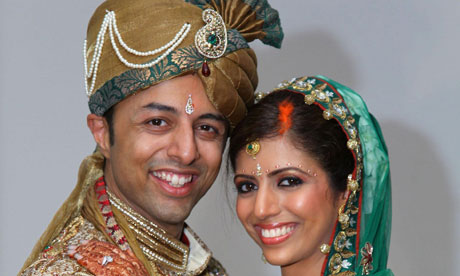Honeymoon murder: South African authorities request extradition of Shrien Dewani
Request at City of Westminster magistrates court over allegations man paid taxi driver to stage hijack and hire hitmen to murder wife

Today, they were separated in a London court, with the groom in the dock as his bride's family listened to claims he had ordered and paid for her murder.
Since she was shot dead on honeymoon after a hijacking in the dangerous Gugulethu township in Cape Town last month, rumours of her 30-year-old husband's alleged involvement have been rife in the South African media.
Today, they culminated in a formal extradition request by the South African authorities at City of Westminster magistrates court over claims he had paid a taxi driver to stage the hijack and hire hitmen to murder his wife – allegations he vehemently denies.
Dewani, arrested last night on an extradition warrant, was spending his second night in custody pending a high court hearing.
He had earlier been granted £250,000 bail by senior district judge Howard Riddle, but the decision was appealed against by the South African judicial authority before he could walk free. He must remain in custody until the appeal is heard.
Looking strained, he spoke in court only to confirm his name, age and address in Westbury on Trym, Bristol.
It was, the judge said, an "allegation centred around the most terrible tragedy". The factual differences between the two competing accounts was "stark", he added.
"Either Mr Dewani, over a period of time, plotted the murder of his wife, or he is one of the tragic victims of this incident," he said. But that was not for this court to decide, he added.
Dewani had told police the taxi driving him and his 28-year-old wife through the township so they could look at the local nightlife was hijacked by two armed men who forced the driver, and later himself, from the vehicle, robbing both of them.
His wife's body was found in the abandoned car on the following day, 14 November, with a single gunshot wound to the neck. She had also been robbed.
Outlining the case against Dewani, lawyer Ben Watson said the accusation that he had ordered her death had been made by the taxi driver, Zola Tongo, who was sentenced to 18 years for his part in the killing by a South African court yesterday.
The sentence was reduced from 25 years in a plea bargain.
Dewani was said to have offered 15,000 rand (£1,400) to Tongo after the driver picked them up from the airport and took them to the five-star Cape Grace hotel, telling him he wanted a woman murdered and for it to look like a hijack.
The driver claimed the alleged hitmen, Xolile Mnguni, 26, and Mzwamadoda Qwabe, also 26, had been hired through a middle man and were told he would be "bringing a couple into the town that evening and the husband wanted his wife murdered".
According to a statement given to South African police, Tongo had the impression that Dewani had been in South Africa before and had "previously arranged for someone to be killed in a fake hijack".
The claims were dismissed as "fanciful" and "improbable in the extreme" by Clare Montgomery QC, acting for Dewani. She said they were based on the word of a "self-confessed group of robbers, and, it appears, now murderers", who had "everything to gain and nothing to lose" in making the accusations.
The case against Dewani was "flimsy" and had been cooked up defend the reputation of South Africa as a tourist destination, she claimed.
It was extremely unlikely that Dewani could arrange a professional hit in the "unfeasibly short time" of one and a half hours between arriving in South Africa and reaching his hotel, she told the court.
The lawyer added that there was no evidence Dewani had travelled to South Africa before, so he could not have arranged another hijacking.
"It is clear that what has happened has been devastating – a nightmare for him to lose his wife and now to be the subject of these allegations," she told the court.
Four things had puzzled investigators from the outset, Watson said. The couple did not use the hotel airport shuttle bus; the taxi driver took them to a restaurant known to be closed; neither Tongo or Dewani were hurt, while the victim was brutally killed; and Tongo had taken them to such a dangerous place late at night.
Watson said Dewani, who comes from a wealthy family and runs a company that owns care homes, had "access to huge sums of money to assist him if he intends to flee".
In granting bail – with strict conditions attached, including an electronic tag and curfew – the judge said Dewani had voluntarily gone to police.
It was clear on the evidence before him that a trial could eventually proceed, he said. But it was "equally clear" that there was a real issue with the case: "In other words, the evidence is such that there is a real possibility that this defendant will be acquitted in due course."
As they left the court, relatives of the murdered woman, including three female cousins who appeared shaken after hearing details of the case, said they wanted "justice for Anni".
Asked whether Dewani should return to South Africa, one man said: "I would say he needs to go."
